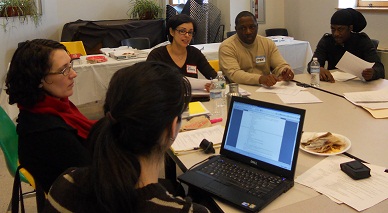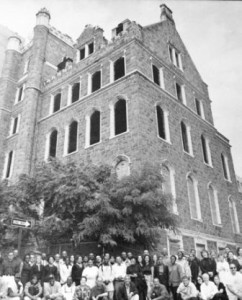Participatory Action Research: The Fortune Society Project

Overview
The International Center for Cooperation and Conflict Resolution (ICCCR) at Teachers College, Columbia University is partnering with The Fortune Society, a Harlem based nonprofit organization that supports formerly incarcerated men and women in reentering society and rebuilding their lives.
These two entities, with support from the Advanced Consortium on Cooperation, Conflict, and Complexity (AC4), are conducting a Participatory Action Research (PAR) project. In the PAR methodology, community members and researchers work together to address challenges faced by the community, and, in so doing, share knowledge and information. Moreover, the researchers learn about the lived-experiences of the community and the community members learn research, self-reflective practices and problem-solving skills.

Project Objectives
- Using a PAR paradigm, investigate the culture (philosophy, policies and practices) of the Fortune Academy and how they impact the success of residents when they re-enter society. Surface the causal models (implicit, explicit) that the leadership holds about how the Academy works.
- Focus on how the Academy culture creates conditions for conflict resolution without violence, using experience and practice rather than conflict resolution theory.
- Reflect on the experiences of PAR team membership and how it creates a collaborative learning community.
Publications
Participatory Action Research, Conflict Resolution and Communities
In The Handbook of Conflict Resolution: Theory and Practice, (3rd Edition)
By Cohen, C.E., Neshkes, R., Pryce-Screen, M., Hernandez, E., Linder, M. & Doherty-Baker, M. (forthcoming)
Services, tools, and resources
In Our Backyard: Overcoming Community Resistance to Reentry Housing (A NIMBY Toolkit)
(In collaboration between C.E. Cohen and B.I Rodriguez, ICCCR at Teachers College, The Fortune Society and the John Jay College of Criminal Justice.)

With over 725,000 men and women being released from prison each year, the need for housing assistance for the formerly incarcerated population is immense. Research has identified a significant relationship between homelessness and re-offending. Unfortunately, a number of barriers place the formerly incarcerated population at a disadvantage when trying to access safe and stable housing, e.g., public housing policies deny access to individuals with certain criminal convictions; the private market is expensive and discrimination is wide-spread; etc.
Community-based service providers in the reentry field have begun to respond to this overwhelming need with few resources. This toolkit highlights the experience of The Fortune Society in its development of a housing project in West Harlem. Through Fortune’s experience, organizations can glean strategies to help them overcome one of the greatest challenges associated with providing housing to formerly incarcerated men and women: Not in My Backyard (“NIMBY.”) NIMBY opposition can result in significant project delays, or even discontinuation. This case study documents how an organization can address a myriad of community concerns and ultimately garner support for its project. By offering tangible steps and lessons learned by Fortune, this toolkit provides guidance and encouragement to those organizations working to assist formerly incarcerated people and create safer communities.
Employing Your Mission: Building Cultural Competence in Reentry Service Agencies Through the Hiring of Individuals Who Are Formerly Incarcerated and/or in Recovery.
(In collaboration between C.E. Cohen and B.I Rodriguez, ICCCR at Teachers College, The Fortune Society and the John Jay College of Criminal Justice.)
This Toolkit was developed to share promising practices for developing cultural competence in organizations that provide services to men and women with histories of incarceration. It highlights the experience of The Fortune Society and their policy of creating cultural competence through the hiring and development of individuals with life histories similar to the reentry client population. This hiring strategy provides job opportunities and skill development to formerly incarcerated men and women and enhances service delivery capability by hiring staff with experiential knowledge.
The Toolkit includes an overview of the relevant scholarly work on culturally competent hiring practices and its impact on organizations and their staff and clients. The Toolkit then details The Fortune Society’s hiring philosophy and the strategies it employs to identify, nurture and develop employees whose experiences mirror the challenges and limited work experiences of Fortune’s clients. It culminates with key lessons and steps to help other organizations as they work to develop or sustain culturally competent hiring practices.
Toolkits
- In Our Backyard: Overcoming Community Resistance to Reentry Housing (A NIMBY Toolkit)
- Employing Your Mission: Building Cultural Competence in Reentry Service Agencies Through the Hiring of Individuals Who Are Formerly Incarcerated and/or in Recovery
For more information about this project contact Kyong Mazzaro at kmazzaro(at)ei.columbia.edu